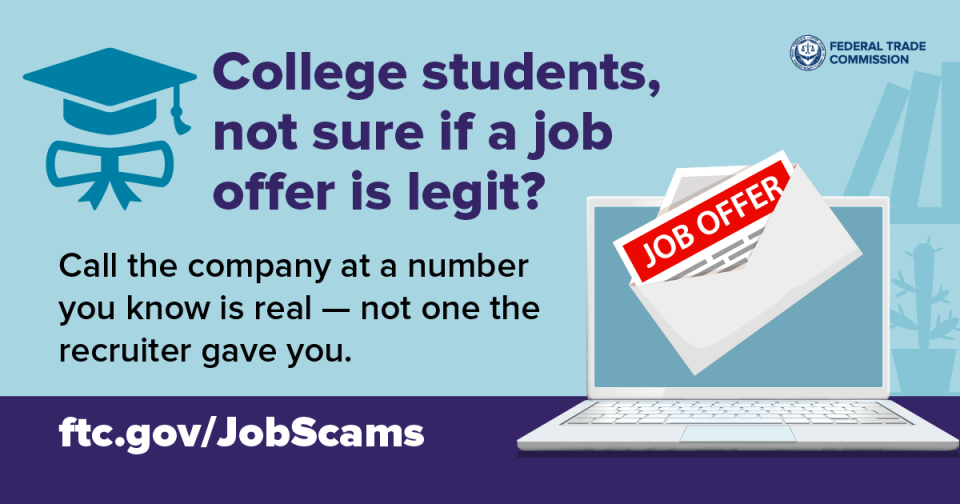If you’ll be seeing college-age relatives over the holidays, warn them about a variation on the “job interview” scam that students looking for summer or permanent employment have reported to us.
Virtual job scams are nothing new, but they’ve taken a personal – and persuasive – turn. College students are telling us they’ve been approached on social media platforms by people claiming to be recruiters for Wall Street firms, tech companies, national retailers, and other attractive places to land a job. The pitch is convincing. The “recruiter” may claim to have a connection at the college and say that the Dean or a professor has recommended the student as a top-flight prospect for the company’s prestigious management program. In some cases, the recruiter may pepper the conversation with faculty names, campus landmarks, or even memories of their days back at good ol’ insert-school-here.
Then comes a series of virtual interviews followed by a lucrative job offer. Next is the usual “HR paperwork” involving the student’s Social Security number, bank account or driver’s license information, or other personal data. In some cases, the recruiter may send a generous check as a “signing bonus,” but needs to have a portion of the cash sent to someone else, perhaps to cover the cost of a company phone or laptop.
What’s really going on? It turns out the “recruiter” is an identity thief who has used publicly available facts – the Dean’s name, well-known professors, school traditions, etc. – to steal personal information or to attempt a fake check scam.
What advice can you give a student to avoid a bogus employment offer?
- Check the recruiter’s “references” first. If a recruiter uses the name of someone at the school, contact the faculty member directly before engaging further. If the story doesn’t check out, it’s a scam. Do your classmates a favor by alerting your college Career Services Office.
- Scrutinize the recruiter’s email address. Corporate executives email from corporate accounts, not from @gmail.com or other personal addresses. Of course, imposters have been known hack into companies’ email systems. A legit-looking address isn’t a guarantee it’s the real deal, but a message from a personal account is a strong sign it’s a scam.
- Pump the brakes if you’re asked for personal information. If the talk turns to bank account data, driver’s license numbers, etc., stop the conversation. Contact the company at a phone number you know to be real – not one the recruiter gave you – and double-check to see if the job offer is genuine.
- Report your experience to the FTC. If you cross paths with a scammer, tell us at reportfraud.ftc.gov.


Good day, Its very important to talk about the students concern in the terms of works in our society, now a days some peoples are giving a fake work, in the sense that they are providing a reputable or a genuine work to the peoples instead, they are given them wrong work. so my advice to our fellow student, we have be very careful, in our day to day activities of finding jobs. Let's make sensible careful look and concerning of whom we are applying for the job, and whom is employing us. before we find our self in it. Thank you . CEO/SEO/MD/SEO/Europe Driv Investment UK/EU Mr. Nuhu Ahmed Sambo